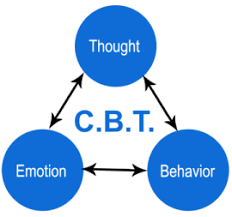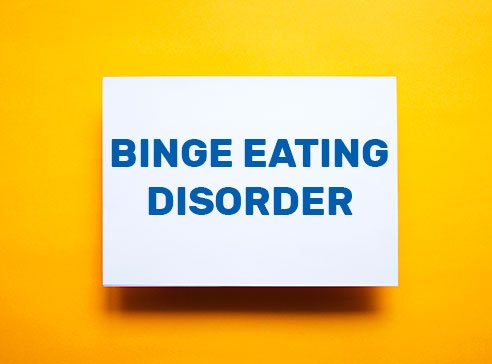Do you find yourself eating more than your body needs? Have you ever noticed that when you eat, it doesn’t satisfy the hunger and craving as it should? If so, there is a chance that you might have a binge eating disorder. Binge Eating Disorder (BED) is a serious condition and one of the most common mental illnesses. it’s important to understand what causes binge eating disorder as well as how to treat it.
Contents
What Is Binge Eating Disorder?

Binge eating disorder (BED) is a type of eating disorder characterized by periods of uncontrolled, excessive food consumption. Unlike people who overeat occasionally, those with BED compulsively eat large quantities of food on a regular basis. As a result, they may become obese or overweight.
Binge eating disorder is a mental health condition that is characterized by recurrent episodes of binge eating. A person with a binge eating disorder may eat large amounts of food in a short period of time, even when they are not hungry. People may feel out of control and ashamed or disgusted with themselves after a bingeing episode.
Binge eating disorder can negatively impact a person’s physical and emotional health, leading to problems such as obesity, diabetes, and depression.
What Causes Binge Eating Disorder?
There is no one cause of binge eating disorder. Some possible causes include genetics, environment, psychological factors, and biological factors.

Genetical Factor
There is growing evidence that binge eating disorder (BED) has a strong genetic component. Studies of twins suggest that genes account for about 50% of the risk for developing BED.
This means that if one twin develops BED, there is a 50% chance the other twin will too. There are likely many different genes that contribute to this risk, and it’s likely that some of these genes make people more sensitive to environmental factors (such as stress) that can trigger binge-eating episodes.
However, just because someone has a gene for BED doesn’t mean they will automatically develop the disorder.
Environmental Factor
It also plays a role in whether or not someone actually develops BED. For example, if someone with the BED gene grew up in a home full of conflict and chaos, that person may be more likely to develop an eating disorder than someone with BED genes who had an emotionally supportive family.
Furthermore, research shows that exposure to images of thin, perfect bodies in the media can contribute to feelings of body dissatisfaction and poor self-esteem, which may increase the risk for binge eating.
Psychological Factor
Psychological factors can contribute to binge eating.
Some people might turn to food as a way to cope with difficult emotions or problems.
Others may have trouble regulating their emotions and may use food as a way to comfort themselves.
Binge eating can also be related to low self-esteem or body image issues.
When someone feels bad about themselves, they may use binge eating as a way to punish themselves or make themselves feel better.
Biological Factors
Some of the biological factors that may contribute to binge eating include genetics, hormones, and brain chemistry. For example, people who have a family history of obesity or binge eating are more likely to develop the disorder themselves.
Additionally, changes in hormone levels can trigger cravings for unhealthy foods and lead to overeating. And finally, certain chemicals in the brain that regulate hunger and pleasure may play a role in triggering binges.
Signs And Symptoms Of Binge Eating Disorder

The signs and symptoms of binge eating disorder include:
- Eating unusually large amounts of food in a short period of time
- Feeling out-of-control during binges Eating
- when you’re not hungry feeling disgusted with yourself after binges
- Avoiding social situations where food might be present
- Secretly eating foods that you wouldn’t normally eat
- Overeating even when you are full
- Experiencing physical problems such as weight gain, high blood pressure, and cholesterol levels
- Having low self-esteem or feeling ashamed of your eating habits
- Feeling depressed or anxious
- Trying to diet but not being able to stick with it
If you think you may have a binge eating disorder, talk to your doctor or mental health professional. Treatment for binge eating disorder usually includes therapy and lifestyle changes. With treatment, most people are able to overcome binge eating disorders and improve their health and quality of life.
Health Risks Of Binge Eating Disorder
There are many health risks associated with binge eating disorders. Some of these risks include:

- Obesity or being overweight
- High blood pressure
- Type II diabetes mellitus
- Gallbladder disease
- Heart disease
- Elevated cholesterol levels
- Sleep apnea
- Joint pain
- Reproductive problems
- Depression and anxiety disorders
- Eating disorders such as anorexia nervosa and bulimia nervosa
Mental Risks Factors
While the underlying causes of BED are still not completely understood, there are several factors that have been linked to the disorder:
- Past trauma
- Abuse
- Mental health problems
- Low self-esteem
- Depression
- “Extreme” emotional distress (i.e.: self-induced vomiting, laxative abuse, etc.)
- Overvaluing thinness and/or appearance in general
- Having unreal fantasies of being a perfectionist
- Food addiction or food dependence
Another common thread among people with BED is emotional eating – using food as a way to cope with difficult emotions instead of seeking out healthier ways of dealing with them. Often this involves feeling anxious, stressed, lonely, sad, etc., then turning to binge for comfort in lieu of reaching out for social support or professional help.
Treatment For Binge Eating Disorder
There are many treatments available that can help you overcome this disorder. Treatment options include:
Cognitive Behavioral Therapy

- Cognitive-behavioral therapy is a form of psychotherapy that helps people to understand the thoughts and feelings that influence their behaviors.
- It can be helpful for binge eating disorders because it can help people to identify the thoughts and beliefs that may contribute to their binges.
- For example, someone with a binge eating disorder may believe that they are bad or unworthy if they do not eat perfectly. Alternatively, they may think that they need to overeat in order to feel good or cope with stress.
- CBT can help people to challenge these thoughts and beliefs and replace them with more realistic ones. This can help reduce the urge to binge eat. Additionally, CBT can also teach people coping skills for dealing with difficult emotions without resorting to food. This can be an important part of recovery from a binge eating disorder.
Dialectical Therapy

- This therapy is a form of cognitive-behavioral therapy that helps people manage their emotions and deal with difficult situations. It has been found to be helpful in the treatment of binge eating disorders.
- Dialectical behavior therapy focuses on teaching skills such as mindfulness, distress tolerance, emotion regulation, and interpersonal effectiveness.
- These skills can help people learn how to better manage their emotions and tolerate difficult situations. They can also help improve communication and relationships.
Interpersonal Therapy

- Interpersonal therapy has been found to be an effective treatment for binge eating disorders. This type of therapy helps people understand the thoughts and feelings that contribute to their binges.
- It also teaches them how to better communicate with others. Interpersonal therapy can help people learn how to cope with difficult emotions in a healthy way. This may lead to less bingeing behavior. Treatment typically lasts around 12 weeks, but it can vary depending on the person’s needs.
- This approach focuses on the relationships between you and others, including family members, friends, and romantic partners.
- It can help to identify any negative thoughts or feelings that may contribute to your binging habit and work through them with a therapist. If you’re struggling with binge eating, it’s worth considering interpersonal therapy as part of your treatment plan.
Nutritional Therapy

- A nutritional therapist can help you to understand how your body works and how different foods affect your mood, energy levels, and behavior. A qualified therapist will also be able to create a personalized nutrition plan for you that can help to improve your binge eating disorder symptoms.
- Binge eating is often a symptom of underlying emotional issues. A nutritional therapist can provide you with support and guidance to help address these issues, which can in turn help reduce your binge eating episodes.
Some of the ways in which a nutritional therapy plan may help to improve your BED symptoms include:
- Eating regular meals and snacks throughout the day to keep blood sugar levels stable.
- Eating balanced meals that are low in processed foods and high in whole foods.
- Avoid sugary drinks and limit caffeine intake.
- Including plenty of fiber-rich foods in your diet as can help to regulate digestion.
- Eating regular meals and snacks throughout the day helps to keep blood sugar levels stable, which can help to reduce cravings for sugary or fatty foods.
- Eating balanced meals that are low in processed foods and high in whole foods can help to stabilize moods and energy levels, reducing the temptation to overeat as a way of coping with negative emotions.
- Avoiding sugary drinks and limiting caffeine intake can help to prevent blood sugar spikes and crashes, which can lead to cravings for sweets and high-fat foods.
Medication
Treatment for Binge Eating Disorder mainly depends on medication therapy to help reduce or stop binging behavior in patients with this condition.

- There are different types of drugs used in treating this health issue including antidepressants, appetite suppressant medications, weight loss supplements, etc.; however, these drugs have not been approved by FDA (Food & Drug Administration) for their treatment purpose specifically.
- The latest research studies show how antidepressant medicines work on brain chemicals such as the serotonin system helps treat emotional components involved in triggering Binge Eating Disorder behaviors like depression and anxiety, which reduces the urge to binge eat or lose control over appetite.
- In addition, Weight loss supplements help patients who are suffering from Binge Eating disorders by suppressing their hunger and boosting up metabolism rate naturally without any side effect that decreases the risk of heart attack or other health issues related to obesity.
- There are also some newer medications that have been developed specifically for the treatment of binge eating disorders, such as lisdexamfetamine (Vyvanse) and topiramate (Topamax).
- If you are struggling with a binge eating disorder, it is important to work with your doctor to find the best medication or combination of medications to help you manage your symptoms.
How To Overcome Binge Eating?
In addition, there are some things you can do on your own to address binge eating. These include:

- Creating a healthy lifestyle habit, such as eating regular meals and snacks, getting enough physical activity, and avoiding excessive amounts of processed foods and sugary drinks.
- Identifying your personal triggers for binge eating and developing strategies to deal with them. This may include challenging negative thoughts or emotions that lead to binging, practicing self-compassion instead of self-judgment, and preparing healthier alternatives to problematic binge foods.
- Creating a binge-free environment at home by getting rid of problematic and triggering food and drink and keeping only healthy options in the house, such as fresh fruit or vegetables, low-fat yogurt, lean protein sources like beans or chicken breast fillets, etc.
- Avoiding triggers for binging during your typical mealtimes (i.e.: dinner) by eating with family instead of alone; serving meals on smaller plates to reduce portion size; using chopsticks to slow down eating speed so you can better notice when you are full before continuing to eat more; savoring every bite because it is important not just what we put in our mouths but how much time we spend enjoying it too.
- Driving past your favorite fast food restaurant without stopping; stocking up on healthy snacks that you can keep with you at all times instead of turning to high-calorie foods when hunger strikes.
- It is also important to be patient and forgiving with yourself as overcoming a binge eating disorder is not a quick or easy process. There will undoubtedly be bumps along the way, but continue working towards your goals and don’t give up on yourself.
Conclusion
Our team is here to help you with all your binge eating disorder needs. If you have a question about what resources are available for people struggling with an eating disorder, please send us a message and we will get back to you as soon as possible. We want everyone who suffers from this disease to know there is hope.
If you are looking for affordable Online Counseling MantraCare can help: Book a trial therapy session


